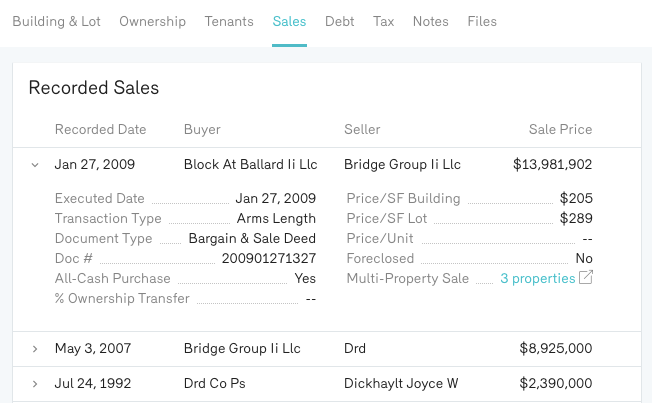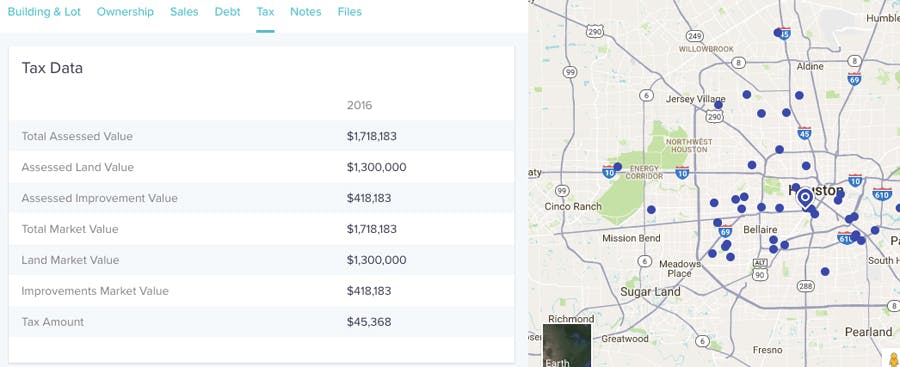Property history
Learn how to find the property history of any commercial asset nationwide and uncover the data most relevant to you.

Whether you are buying/selling, mediating the purchase or sale, or servicing a multifamily, land, or commercial parcel of any kind, searching the history of the property will always help develop a more detailed understanding of that asset and its owner.
The more information you have on the property, the more informed your decisions will be surrounding it. When analyzing properties in Reonomy’s web app, you can build a holistic and historical view of any property through levels of property, people, and company-based information.
Property history
Fortunately, you no longer have to spend valuable time taking trips to your local county recorder, clerk, or assessor’s office. You can now search for the history on any commercial property nationwide with speed and ease using Reonomy. First, let’s run through a few examples of the common ways in which Reonomy users identify the history of their target properties.
Property history search
The most common way that people search property history is by looking up a known property—either by using its address or the name of the owner.
Property history search by address
Reonomy lets you access a property’s sales, mortgage, and building history, as well as current information about the owner, tenants, and tax valuations, all by simply searching a street address. In the search bar that headlines Reonomy’s search app, you can enter an address, and you’ll be taken directly to the profile page of that exact parcel. Tabs of information include Building & Lot, Ownership, Tenants, Sales, Debt, and Tax. The Ownership and Tenants tabs include the contact information of the people behind ownership (even if behind an LLC) and the decision-makers of business tenants.
Property history search by owner
If you already know who the owning person or entity is behind a property, you can also navigate to the Ownership tab of Reonomy’s search app to simply search the name of the owner and find a property’s history that way. Once you have clicked “Apply,” you’ll instead be taken to a list of properties, as the owner may own multiple properties. From that list, you can then click any address, where you’ll then go to the profile page of the individual asset as mentioned above.
Property sales history
Property sales history shows the transactional past of any multifamily, land, or commercial asset. On Reonomy, comprehensive sales records show the past sales of a property, along with the parties that were involved (i.e. past owners), the sales price of each transaction, the date the sale was recorded, the price per square foot, the document type and number, and much more.

You can see all of this information for each sale separately, listed in date succession.
Why property sales history is useful
Uncovering the sales history of a property can be valuable in several capacities:
Sales comps are derived largely from property sales history
Sales records are what enable the creation of comparables, or comps, for commercial assets. Comps for commercial real estate are simply assets that are very similar to that of a single, subject asset. They are similar in value, size, and type, and are under very similar environmental, market, and geographical influences.
Learn about Reonomy comps in the video below:
It helps you find potential property buyers
Analyzing a property’s sales history can help you see whether a property has or has not been sold recently. When looking for commercial real estate buyers off-market, recent sellers and buyers are a good audience to pitch to. Recent buyers could be looking to expand their portfolio by purchasing similar properties to their own. Recent sellers, on the other hand, have some cash on-hand, and could be looking to reinvest that capital if the right deal were to arise.
It helps you find potential property sellers, as well
Property sales history allows you to understand the intent of the current owner. You can see what their typical holding period is (by looking at multiple properties), and you can see how long they’ve been holding one property in particular. If they’ve been holding a property for 10 or more years, for example, they may be very willing to negotiate an off-market transaction with you. The sales history also shows what the current owner paid for the property and when they purchased the property.
What they paid and when they paid it can give you insight into what they’d be looking for now as a fair price of sale. All of this allows you to tailor your pitch on a very granular level, and speak to owners very directly about their ownership past and present.
Property sales history can show abnormal transactions or red flags
A sales history search will uncover unusual transactional patterns of a property. Sales history outlines if a property has transacted several times in a short period. It also shows if there has been an abnormal number of transactions through the property’s history. Either of these could be a red flag for you when assessing the property. If anything, it prompts further due diligence.
Property ownership history
A property’s ownership history shows the change in ownership throughout a property’s history. It outlines the previous property owners, the dates of ownership change and details on the current owner. In any asset’s profile page on Reonomy, by looking at the sales history and current owner records, you can gain a fuller picture of ownership history. Understanding the ownership history of a property is important, it helps with the following:
Find prospect owners to target
Lookingat the ownership history of a property uncovers information on the current owner and what their possible intentions are (as it does when looking at sales history). You can use Reonomy’s search filters to search for properties that have or have not been sold in a specific time range, as well as how much they paid for the property. Reonomy also allows you to see the full ownership portfolio of a single owner. By searching an owner’s name or mailing address, you can analyze the property history of all of their properties, even if those properties are owned under different LLCs.
You can also search for owners based on their location and the types of properties they own, as well as the types of businesses within those buildings, and more.
Get into to contact with the current owner
Reonomy property owner records include the contact information of the owner(s), including the contact details of the individuals that are part of an owning-LLC. Find the property owner’s phone number, email and mailing address to make contact. Contacting the owner directly ensures you save time in coming to a decision. You can use the property’s full historical overview to fuel your pitch as well, and prove to individual owners that you’re a student of their portfolio, as well as an industry expert.
Property mortgage history
Search for a property’s mortgage history to find the most recent debt positions on a property, as well as the past loans taken out on the property. Analyze property mortgage history for the following debt details:
Loan Origination Date
Loan Maturity Date
Total Loan Value
Lender
Likewise, you can search for properties based on the above details, to instead back into properties with a certain loan history. When prospecting, apply search filters by date or value ranges. Search for properties with a mortgage value between your target value range. Search a date range to filter for properties with a certain origination date or a maturity date to find those coming to terms on a loan or looking to refinance.
Building history
Reonomy’s building and lot records on commercial assets show you the year a build was constructed, as well as the last time the building was renovated.
Property tax history
Property tax history shows the annual tax rate, annual tax commitments, and the property’s assessed and market values. This information is useful when calculating the NOI or cap rate of a property. The annual tax commitment is a significant expense to include in these calculations. A property’s assessed value can aid in estimating the current value of a property.

Property history report
Combine all of the above information to generate a property history report on any individual asset. Sales, ownership, debt, and tax history enable you to develop a full picture of any one commercial asset. Combine historic records with current building level data to customize your report. From there, you can dive into owner contact information to begin your outreach process in the case of buying, selling, mediating a buy or sell, or servicing a commercial property.
Author

Reonomy
Resources team
Author

Reonomy
Resources team



